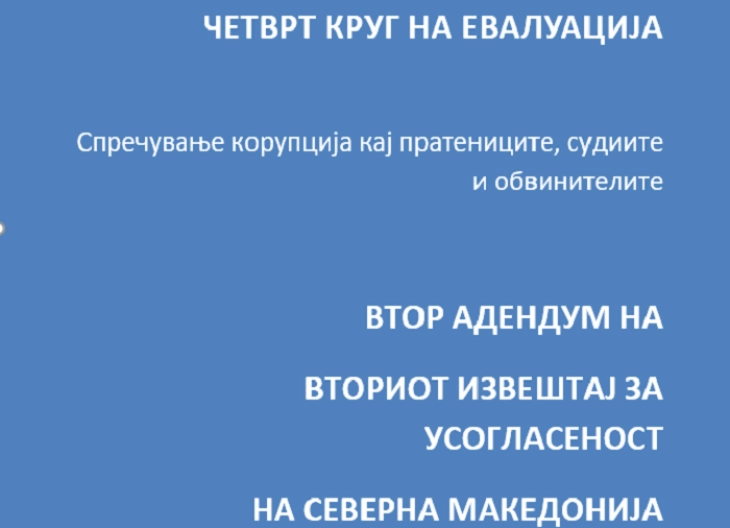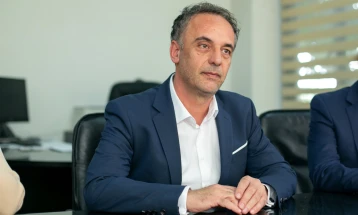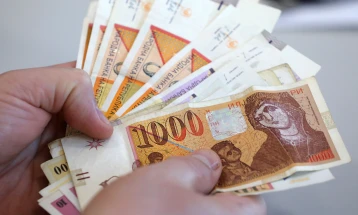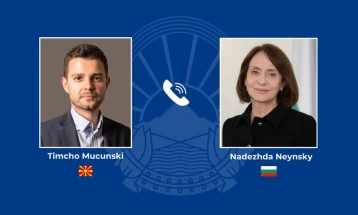GRECO report on North Macedonia: 14 recommendations satisfactorily implemented, four partially, and one not implemented
- The Group of States against Corruption (GRECO) has made public on Tuesday its Fourth Evaluation Round Second Addendum to the 2nd Compliance Report on North Macedonia, which deals with corruption prevention in respect of members of parliament, judges and prosecutors.

Brussels, 12 March 2024 (MIA) – The Group of States against Corruption (GRECO) has made public on Tuesday its Fourth Evaluation Round Second Addendum to the 2nd Compliance Report on North Macedonia, which deals with corruption prevention in respect of members of parliament, judges and prosecutors.
Progress can be noted in the implementation of the recommendations addressed to North Macedonia in the Fourth Round Evaluation Report. Fourteen of the nineteen recommendations have been implemented satisfactorily or dealt with in a satisfactory manner, four recommendations have been partly implemented and one recommendation has not been implemented.
Regarding MPs, the authorities have referred to progress made in streamlining the Code of Ethics for MPs, as well as in developing a training programme for MPs on the implementation of the Code and the training of trainers to ensure future awareness of ethics and integrity standards, GRECO said in the report.
“Other developments are still in the making, notably the function of confidential counselling and mentoring will be addressed in the upcoming Assembly’s new Rules of Procedure and internal rules for the Law on Lobbying are in preparation with the Assembly’s Committee on Procedure and Mandate-Immunity Issues. GRECO regrets that there has been no improvement regarding the sanctioning system provided in the LPCCI,” reads the document.
With respect to the judiciary, GRECO reiterates its concerns regarding ex officio membership of the Minister of Justice in the Judicial Council. As for prosecutors, the only outstanding recommendation concerns extending the range of sanctions available for disciplinary violations by prosecutors. The authorities indicated that this recommendation will be addressed when the Law on Public Prosecution will be amended.
“To this end, GRECO would like to encourage the authorities to do so as soon as possible,” reads the report.

GRECO recommended swiftly proceeding with the development of a code of conduct for members of the Assembly and ensuring that the future code is made easily accessible to the public; establishing a suitable mechanism within the Assembly, both to promote the code and raise awareness among its members on the standards expected of them, but also to enforce such standards where necessary.
GRECO assessed this recommendation as partly implemented in the Addendum to the Second Compliance Report. GRECO had taken note of the draft Code of Ethics for MPs and its implementing Guidelines. Although the draft Code and the Guidelines represented a suitable framework for promoting integrity and guiding the ethical behaviour of MPs, GRECO considered that they would benefit from further refinement and streamlining to render them more user-friendly, eliminate redundant content and ensure clarity and coherence of corresponding provisions. GRECO welcomed the awareness-raising activities for MPs for promoting integrity and guiding ethical behaviour but noted that these needed to be adjusted to the new Code and Guidelines, once in place.
GRECO recommended that rules and guidance be developed for prosecutors on the acceptance of gifts, hospitality and other advantages and that compliance with these rules be properly monitored.
GRECO recommended that appropriate legal, institutional and operational measures be put in place to ensure a more in-depth scrutiny of statements of interest and asset declarations submitted by Members of Parliament, judges and prosecutors, in particular by streamlining the verification process under the aegis of the State Commission for the Prevention of Corruption.
GRECO assessed this recommendation as partly implemented in the Addendum to the Second Compliance Report. GRECO had taken note of the data provided on the supervision exercised by the State Commission for Prevention of Corruption (SCPC) over the content of asset declarations submitted by MPs, judges and prosecutors, which appeared to point to a greater compliance with the reporting obligation by all three professional groups, thanks to the administrative checks performed by the SCPC.
As for prosecutors, the only outstanding recommendation concerns extending the range of sanctions available for disciplinary violations by prosecutors. The authorities indicated that this recommendation will be addressed when the Law on Public Prosecution will be amended. To this end, GRECO would like to encourage the authorities to do so as soon as possible.
The adoption of this Second Addendum to the Second Compliance Report terminates the Fourth-Round compliance procedure in respect of North Macedonia. The authorities of North Macedonia may, however, wish to inform GRECO of further developments with regard to the implementation of the outstanding recommendation ii, iii, iv, v and xvi.
Finally, GRECO invites the authorities of North Macedonia to authorise, as soon as possible, the publication of the report, to translate it into the national language and to make the translation public, reads the report.
This report was adopted by GRECO at its 95th Plenary Meeting (Strasbourg, 27 November – 1 December 2023).
The Fourth Round Evaluation Report on North Macedonia was adopted at GRECO’s 62nd Plenary Meeting (6 December 2013) and made public on 17 March 2014, following authorisation by North Macedonia. The corresponding first Compliance Report was adopted at GRECO’s 72nd Plenary Meeting (1 July 2016) and made public on 12 October 2016.
In the Second Compliance Report adopted by GRECO at its 80th Plenary Meeting (22 June 2018) and made public on 9 August 2018, following authorisation by North Macedonia, it was concluded that North Macedonia had implemented satisfactorily or dealt with in a satisfactory manner six of the 19 recommendations contained in the Fourth Round Evaluation Report. GRECO considered the compliance level as “globally unsatisfactory” and decided to apply its “non-compliance” procedure.

The Interim Compliance Report was adopted by GRECO at its 85th Plenary Meeting (25 September 2020) and made public on 2 October 2020, following authorisation by North Macedonia. It was concluded that North Macedonia had implemented satisfactorily or dealt with in a satisfactory manner, nine of the 19 recommendations contained in the Fourth Round Evaluation Report. Consequently, the level of compliance was no longer considered "globally unsatisfactory" in the meaning of Rule 31 revised, paragraph 8.3 of the Rules of Procedure and GRECO discontinued its “non-compliance procedure under Rule 32.
In the Addendum to the Second Compliance Report, adopted by GRECO at its 90th Plenary Meeting (25 March 2022) and made public on 4 July 2022 following the authorisation of North Macedonia, only modest progress was noted. Nine of the 19 recommendations had been implemented satisfactorily or dealt with in a satisfactory manner, nine recommendations had been partly implemented and one recommendation had not been implemented.
As required by GRECO's Rules of Procedure, the authorities of North Macedonia submitted a Situation Report with additional information regarding measures taken to implement the ten pending recommendations which, according to the Addendum to the Second Compliance Report, had been partly or not implemented. The Situation Report was received on 5 April 2023 and served as a basis for this Second Addendum to the Second Compliance Report.
GRECO selected Armenia (in respect of parliamentary assemblies) and Denmark (in respect of judicial institutions) to appoint Rapporteurs for the compliance procedure. The Rapporteurs appointed were Ms Tatevik Khachatryan, on behalf of Armenia, and Mr Jonathan Gasseholm, on behalf of Denmark. They were assisted by GRECO’s Secretariat in drawing up this Second Addendum to the Second Compliance Report.
Photo: GRECO/MIA archive







